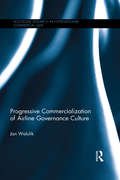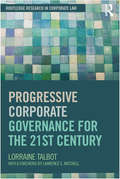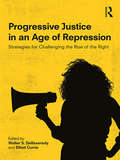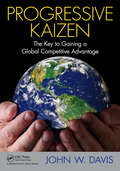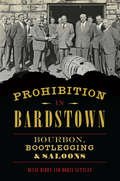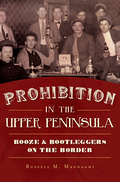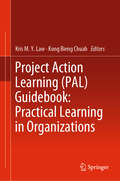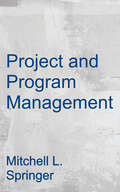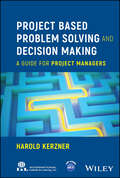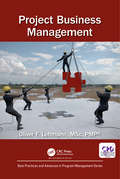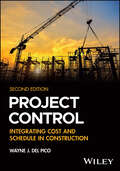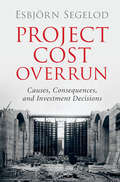- Table View
- List View
Progressive Commercialization of Airline Governance Culture (Routledge Research in International Commercial Law)
by Jan WalulikProgressive Commercialization of Airline Governance Culture analyzes the transition of the airline sector from the not-for-profit nation-bound public utility model towards a profit-oriented globalized industry. It illustrates how legal, political, historical and cultural factors have shaped the corporate governance in the airline sector, and describes how these factors influence economic decisions and performance. The unique feature of the book is that the subject is consequentially discussed from the perspective of airline governance culture. This approach links the examination of legal and policy factors which influence airline activities together with a discussion of economic issues, all within one clear, coherent and comprehensive framework.
Progressive Corp.
by John R. Wells Marina Lutova Ilan SenderFor decades, Progressive has proven to be one of the most innovative players in the US auto insurance industry, but can it maintain its lead? Progressive has moved up to the number three position in the industry in 2006, but competitors are finally waking up to the threat the company poses. Can they make it to the number one slot? If so, how? What advice would you give CEO Glenn Renwick?
Progressive Corp.
by Michael E. Porter Nicolaj SiggelkowProgressive is a leader in providing nonstandard (high-risk) automobile insurance to drivers across America, with a long record of extraordinary profitability. Progressive is facing a challenge in its segment from Allstate, the industry leader, and must decide how to respond.
Progressive Corporate Governance for the 21st Century (Routledge Research in Corporate Law)
by Lorraine TalbotProgressive Corporate Governance for the 21st Century is a wide ranging and ambitious study of why corporate governance is the shape that it is, and how it can be better. The book sets out the emergence of shareholder primacy orientated corporate governance using a study of historical developments in the United Kingdom and the United States. Talbot sees shareholder primacy as a political choice made by governments, not a ‘natural’ feature of the inevitable market. She describes the periods of progressive corporate governance which governments promoted in the middle of the 20th century using a close examination of the theories of the company which then prevailed. She critically examines the rise of neoliberal theories on the company and corporate governance and argues that they have had a negative and regressive impact on social and economic development. In examining contemporary corporate governance she shows how regulatory styles as informed and described by prevailing regulatory theories, enables neoliberal outcomes. She illustrates how United Kingdom-derived corporate governance codes have informed the corporate governance initiatives of European and global institutions. From this she argues that neoliberalism has re-entered ex command transition economies through those United Kingdom and OECD inspired corporate governance Codes over a decade after the earlier failed and destructive neoliberal prescriptions for transition had been rejected. Throughout, Talbot argues that shareholder primacy has socially regressive outcomes and firmly takes a stand against current initiatives to enhance shareholder voting in such issues as director remuneration. The book concludes with a series of proposals to recalibrate the power between those involved in company activity; shareholders, directors and employees so that the public company can begin to work for the public and not shareholders.
Progressive Corporate Law
by Lawrence E MitchellReflecting recent re-examinations of the nature and purpose of the modern publicly held corporation, Progressive Corporate Law introduces the reader to alternative perspectives within the field. The contributors to this volume are loosely bound both by their rejection of the prevailing paradigm of the corporation as a public good designed exclusively for the maximization of private profit and by their affirmative goal of designing corporate laws that accord better with the corporation's political and social realities. The resulting series of visions emphasizes communitarian themes of efficiency and morality of responsibility, altruism, and unity within the corporate form as well as between the corporation and the broader society. Progressive Corporate Law is important reading for business executives, lawyers, policymakers, and others who are concerned with the role of corporations in modem life. Designed to act as a springboard for stimulating discussion, it will be a valuable supplement to courses and seminars in corporate law and business ethics.
Progressive Corporation: Variable Dividends
by Timothy A. Luehrman Brenda ChiaIn 2006, Progressive Corporation announced a change in its dividend policy. Henceforth, dividends would be paid annually rather than quarterly and, more important, would be set according to a formula that would result in considerably greater year-to-year variability than was the case historically. Under the new policy, dividends would be tied to the company's underwriting results, its performance relative to pre-determined goals, and a target payout ratio. Progressive's new policy was intended to help with overall capital management in the cyclical property and casualty insurance business.
Progressive Discipline Handbook
by Lisa Guerin J.D.For the employer who needs an effective approach to coaching and disciplining employees. In today's litigious world, managers and supervisors must ensure that when they discipline their employees, they do so fairly. Otherwise, they may end up dealing with expensive legal problems. Fortunately, The Progressive Discipline Handbook helps prevent days in court. A complete how-to guide full of practical and legal advice, you'll find out how to: - identify an appropriate level of discipline - deal with employees when discipline is necessary - correct and monitor problems - prevent future problems Plus, you'll get useful forms, checklists and audio dialogues, and quizzes to reinforce core lessons. Best of all, The Progressive Discipline Handbook can be used with any progressive discipline policy already in place -- making it easy to implement. It also provides tips and strategies that help managers handle one of the most difficult parts of their jobs: Communicating with employees about discipline problems.
Progressive Inequality
by David HuyssenThe Progressive Era has been depicted as a seismic event in American history--a landslide of reform that curbed capitalist excesses and reduced the gulf between rich and poor. Progressive Inequality" cuts against the grain of this popular consensus, demonstrating how income inequality's growth prior to the stock market crash of 1929 continued to aggravate class divisions. As David Huyssen makes clear, Progressive attempts to alleviate economic injustice often had the effect of entrenching class animosity, making it more, not less, acute. Huyssen interweaves dramatic stories of wealthy and poor New Yorkers at the turn of the twentieth century, uncovering how initiatives in charity, labor struggles, and housing reform chafed against social, economic, and cultural differences. These cross-class actions took three main forms: prescription, in which the rich attempted to dictate the behavior of the poor; cooperation, in which mutual interest engendered good-faith collaboration; and conflict, in which sharply diverging interests produced escalating class violence. In cases where reform backfired, it reinforced a set of class biases that remain prevalent in America today, especially the notion that wealth derives from individual merit and poverty from lack of initiative. A major contribution to the history of American capitalism, Progressive Inequality" makes tangible the abstract dynamics of class relations by recovering the lived encounters between rich and poor--as allies, adversaries, or subjects to inculcate--and opens a rare window onto economic and social debates in our own time.
Progressive Justice in an Age of Repression: Strategies for Challenging the Rise of the Right
by Elliott Currie Walter S. DeKeseredyProgressive Justice in an Age of Repression provides a much-needed engagement with questions of justice and reform within the current phase of global capitalism, one that is marked not only by significant social inequality, but also political bifurcation. It offers guidance on progressive strategies for resistance. It also extends criminological analysis by situating these contemporary challenges as globalized and inextricably linked to questions of political economy, law, and society. Bringing together an international selection of scholars, this book draws on a range of issues, such as immigration, street crime and the renewed push for "law and order," violence against women, environmental injustice, assaults on health care and social services, and the unleashing of private corporate exploitation of natural resources. It is a clarion for strategic thinking, a call for action fuelled by informed analysis, and a reimagining of the progressive society that is under attack by Trumpism, populism, and a rising right. This is an important read for those who teach and study criminology, deviance and social control, social problems, legal studies, political science, and policy studies. It is also a useful resource for practitioners, community-based activists, and policy makers seeking new ways of thinking critically about crime, law, and social control.
Progressive Kaizen: The Key to Gaining a Global Competitive Advantage
by John W. DavisThis book addresses how to make Kaizen a formidable competitive weapon. It serves as reinforcement for the key role the Lean coordinator holds in training and leading change that serves to make and keep a manufacturing firm world competitive.
Progressive Policies for Economic Development: Economic Diversification and Social Inclusion after Climate Change
by Alfredo Saad-FilhoDespite the unprecedented gravity of the challenges posed by global warming, most political systems have not given them the required priority. The oil industry has resisted, and many countries have taken only token measures to reduce emissions and mitigate the worst effects. In this context, this book examines the progressive options available to today’s developing countries as they face the limitations of neoliberalism and the existential challenge of global warming. Examining the cases of both low-income fossil fuel-dependent economies and large middle-income economies, this book argues that for all developing economies the best way forward includes ‘green’ macroeconomic policies articulated with progressive industrial and social policies, thus allowing these countries to achieve economic diversification, build alternative drivers of growth, and deliver improvements in the distribution of income, wealth and power. There is urgent need for this progressive policy agenda - grounded on heterodox economics, committed to social integration and the reduction of multiple inequalities - to improve the economic outcomes for these countries, improve the lives of citizens and meet global climate targets. The book argues that capitalism challenges the possibility of free and dignified existence while climate change challenges the possibility of life itself, and that these challenges must be confronted together. Since neoliberal capitalism will not adopt the necessary policies to reduce carbon emissions rapidly, it must be overthrown – not only for ethical or logical reasons, or to shift to better arrangements for the functioning of society, but in order to preserve the conditions for life itself. This agenda for progressive economic development is essential reading for anyone interested in heterodox economics, development studies, international politics, international relations and sustainable business.
Progressive, 2007-2013
by John R. Wells Galen DanskinIn 2013, Progressive was the fourth largest player in the auto insurance market, having lost the third position to GEICO in 2008. As the industry shifted from agency to online sales, GEICO's direct selling model positioned it strongly for growth. Progressive's direct sales mix had increased from 36% of total sales in 2006 to 42% in 2012, well ahead of the industry average of around 25%. As a result, both Progressive and GEICO continued to gain ground on industry leaders, State Farm and Allstate, who sold less than 5% of their policies direct. In 2013, Progressive hoped to revolutionize the purchasing of auto insurance and to build its competitive position with Snapshot, a new usage-based pricing product. First introduced in 2011, Snapshot had low rates of adoption through 2012, but Progressive was redoubling its efforts in 2013 to educate consumers about the product's benefits, which included potential savings of as much as 30% for some drivers. Progressive was also intent on building share with customers who purchased multiple insurance policies since they tended to be more loyal and profitable. Whether these moves would be sufficient to catch up with GECIO was unclear, but they seemed to be working well against State Farm and Allstate.
Prohibition in Bardstown: Bourbon, Bootlegging & Saloons (American Palate)
by Dixie Hibbs Doris SettlesSome Bardstown, Kentucky residents argued for an alcohol ban as early as the mid-1800s despite the fact that whiskey and bourbon were local staples. When Prohibition finally arrived, independent and inventive residents secretly kept the city wet. A deacon once stored whiskey in a baptismal pool. Seventy-year-old Aunt Be-At Hurst allegedly made her homebrew out of her bathtub. Some locals even burned distillery warehouses to cover up thefts. Crime ran so rampant that revenue collector Robert H. Lucas threatened to have the governor summon the state militia. Join historians Dixie Hibbs and Doris Settles as they detail the history of Bardstown booze.
Prohibition in the Upper Peninsula: Booze & Bootleggers on the Border (American Palate)
by Russell M. MagnaghiTemperance workers had their work cut out for them in the Upper Peninsula. It was a wild and woolly place where moonshiners, bootleggers and rumrunners thrived. Al Capone and the Purple Gang came north to keep Canadian whiskey passing through Sault Ste. Marie to Chicago and Detroit. Federal enforcement agent John Fillion double-crossed both his office and the bootleggers. The Grand Hotel on Mackinac Island survived due to gambling and fine Canadian whiskey brought in by rumrunners, sometimes assisted by the Coast Guard. Author Russell M. Magnaghi dives into the raucous history of Yooper Prohibition.
Project Action Learning (PAL) Guidebook: Practical Learning in Organizations
by Kris M. Y. Law Kong Bieng ChuahThis book presents the fundamental concepts of organizational learning (OL) and related topics. In addition, it discusses various factors that influence the success of, and readiness to adopt, OL. In the modern competitive market, companies are looking for ways to excel by focusing more on innovation and knowledge discovery. In response, the book presents a ready-to-use tool for driving OL, called Project Action Learning (PAL). The PAL framework helps teams effectively work on, and learn from, meaningful projects. In this regard, equal emphasis is placed on achieving the project outcome and the participants’ learning objectives. Moreover, the book offers a step-by-step guidebook on how PAL-driven OL can be achieved, making it a valuable asset for educators and practitioners alike.
Project Adaptation: Dealing with What You Cannot Anticipate
by Harvard Business Review PressDealing with hard-to-anticipate risks requires a certain amount of adaptability. Unanticipated risks tend to originate from three main sources: new technology, new kinds of work, and a substantially larger project scope than team members are accustomed to. This chapter emphasizes that for projects with a high degree of uncertainty, an adaptive project management style reduces reliance on decision tools that require predictability.
Project Analysis in Developing Countries: Cost Benefit Analysis for Development
by John Weiss Steve CurryThis updated new edition explores the techniques used to assess the economic impact of projects in developing countries. Blending an academic understanding of economics and development with an accessible style and practical advice, the costs and benefits of investment projects, an important mechanism for economic development, are assessed to ensure that resource allocation is as productive as possible. New material has been added, particularly on the environmental impact of projects, the role of the discount rate in decision-taking, the application of techniques to estimate willingness to pay for benefit estimation and the quantification of health impacts.Although the basic techniques of project analysis were developed many decades ago, they remain highly relevant to address current concerns, such as population growth, urbanisation, pressure on physical infrastructure, inequality, and the climate crisis. This book aims to provide an accessible overview, drawn from extensive practical experience, of project analysis in developing countries. It will be relevant to students, researchers, and practitioners interested in development economics.
Project And Program Management: A Competency-based Approach, Fifth Edition
by Mitchell L. SpringerChoosing the right people to carry out a project is essential to its success, and when multiple projects are combined into a complex program, the human aspect becomes even more important. Project and Program Management: A Competency-Based Approach, Fifth Edition balances a complete account of the technical aspects of project and program management with a practical approach to understanding and developing the core competencies required to accomplish desired goals. On the technical side, this book is a complete introduction to predicting costs, setting schedules, and assessing risks. On the human side, it sheds new light on how to mold different personality types into a team, how to motivate the team's members, and how to produce extraordinary results. The author details the blocking and tackling of the program management approach, describing the best way to define, organize, and schedule the work to be done, while identifying risks and controlling costs throughout the process. This fifth edition has been significantly revised, with every chapter updated. The volume considers the magnitude of recent social, political, and technological changes. Included are insights from numerous students who bring to the forefront their current real-world practices from their individual businesses, industries, and disciplines.
Project Animal Farm: An Accidental Journey into the Secret World of Farming and the Truth About Our Food
by Sonia FaruqiBorn out of a global expedition fearlessly undertaken by a young woman, Project Animal Farm offers a riveting and revealing look at what truly happens behind farm doors. Sonia Faruqi, an Ivy League graduate and investment banker, had no idea that the night she arrived at the doorstep of a dairy farm would mark the beginning of a journey that would ultimately wind all the way around the world. Instead of turning away from the animal cruelty she came to witness, Sonia made the most courageous decision of her life: a commitment to change things. Driven by impulsive will and searing passion, Sonia left behind everything she knew and loved to search the planet for solutions to benefit animals, human health, and the environment. Over the course of living with farmers, hitchhiking with strangers, and risking her life, she developed surprising insights and solutions--both about the food industry and herself. Lively and heartfelt, Sonia takes readers on an unforgettable adventure from top-secret egg warehouses in Canada to dairy feedlots in the United States, from farm offices in Mexico to lush pastures in Belize, from flocks of village chickens in Indonesia to factory farms in Malaysia. Revelatory in scope, Project Animal Farm illuminates a hidden world that plays a part in all of our lives.
Project Based Problem Solving and Decision Making: A Guide for Project Managers
by Harold KerznerPROJECT BASED PROBLEM SOLVING AND DECISION MAKING A project manager’s guide to solving complex project issues and making strategic decisions An everyday resource for project managers who are tasked with identifying and solving complex problems, Project Based Problem Solving and Decision Making offers valuable guidance on how to make informed decisions that move projects forward, provides project managers with expert advice for communicating clearly and effectively with team members and project stakeholders, and describes how to effectively lead project teams and empower team members to make strategic project decisions. Written by Dr. Harold Kerzner, bestselling author and one of the leading minds in project management, Project Based Problem Solving and Decision Making includes information on: Developing effective problem-solving and decision-making???important skills for professional project managers Leading teams, setting and achieving goals, and making sure that projects are completed on time and within budget Identifying and solving problems that arise during complex projects, and making informed decisions that move projects forward Using a project-based approach: breaking the project down into smaller, manageable??chunks and tackling each one separately Focusing on specific problems or decisions and implementing solutions tailored to the??specific needs of the project Project Based Problem Solving and Decision Making is an essential everyday resource for professional project managers, as well as students studying project management. Dr. Kerzner is not only a world-renowned author in project management but also serves as the Senior Executive Director at the International Institute for Learning, Inc. (IIL). To explore more about IIL’s offerings, visit www.iil.com or get in touch via email at learning@iil.com.
Project Business Management (Best Practices in Portfolio, Program, and Project Management)
by Oliver F. LehmannRoughly half of all project managers have to lead customer projects as profit centers on contractor side with two big objectives: making the customer happy and bringing money home. Customer projects are a high-risk business on both sides, customers and contractors, but the dynamics of this business have so far been mostly ignored in literature. The book is intended to fill this gap. The book helps project managers better understand the dynamics of customer projects under contract from business development through handover and find solutions for common problems. A central aspect is international contract laws, an often underestimated factor in projects.
Project Control: Integrating Cost and Schedule in Construction (Rsmeans Ser.)
by Wayne J. Del PicoPROJECT CONTROL Reader-friendly, integrated approach to construction project cost and scheduling control, with all-new pedagogical elements The Second Edition of Project Control is an introductory practical guide that explores the reasons and methodologies for proper planning, monitoring, and controlling project costs and schedule and shows how productivity models are created, monitored, and controlled, as well as how corrective actions are implemented as deviations from the baseline occur. Project Control uses simple language to convey project control principles, making it an excellent resource to teach with and learn from in a classroom setting. This Second Edition has been updated with all-new pedagogical elements and ancillary materials for use in the construction project management classroom. This new edition features all-new sections on baseline scheduling, estimate development, probability analysis, and more. Written by Wayne Del Pico, a seasoned professional with over 40 years of experience in construction project controls, Project Control includes detailed information on: Role of the project manager, covering leading the project team, creating the project plan, developing the project schedule, and monitoring project progress over time Project control cycles, covering plans to achieve goals, executing work according to plan, identifying variations and their causes, and executive work and measure changes Pre-construction planning, covering key personnel and responsibilities and establishing baselines for schedule and cost control Budgeting, covering types of estimates, organization estimates, and harnessing the budget as a management tool Providing expert insight into the management skills of the project manager combined with the analytical focus of the accountant and the “big picture” oversight of the executive, Project Control is an essential resource for students in construction management programs and professionals in construction firms with specializations in long-term infrastructure projects.
Project Cost Overrun: Causes, Consequences, and Investment Decisions
by Esbjörn SegelodCost overrun is common in public and private sector projects. Costs tend to grow, plans fail and financial problems follow, but how can we approve the right projects if we cannot estimate their true cost? This book, for academics in project management, management accounting and corporate finance, as well as for managers in the public and private sectors, offers a new way of thinking about the causes and consequences of cost overrun for firms and society. It demonstrates that there is a logic behind cost growth and overrun, identifies projects and situations that are more vulnerable, and examines the effects of increased costs. It further identifies the negative and positive consequences of cost overrun, analyses how and why preconditions for cost overrun differ when the logic governing private firms dominates versus the logic of the political sector, and explains why cost can sometimes be of lesser importance to decision makers. Approaches the topical subject of project cost overrun in a new light, providing new perspectives and approaches on the positive effects of cost overrun, differences in the logic of economics and politics, and terror management theory. Provides scholarly, critical analysis and evidence to support the practical backbone of the work, allowing readers to apply their knowledge to real-life situations. Approaches private and public sector projects with equal importance, using previously-unseen data from the private sector to highlight valuable lessons on cost overrun.
Project Cost Recording and Reporting
by Alexia NalewaikCommunication is a vital part of project management, and reports are one of the preferred vehicles for transmitting information to an intended internal or external audience. Reports are also part of the system of control and governance on projects, used to bring attention to issues and prompt action to improve project outcomes. There are countless ways of combining project information for consumption by stakeholders. This book discusses the purpose of project reports, and provides examples of the format, content, timing, and audience for various types. Using principles of stakeholders and risk management, it presents a rationale for communication plans, enabling appropriate reporting at the project, program, and portfolio level. The author also: Presents tangible experience and suggestions for developing project reports. Discusses project reports in context, as applicable to types of stakeholders and the project lifecycle. Identifies sources and types of data required for adequate reporting. Offers examples of report formats, graphics, and content. Reflects on typical challenges encountered with project reporting. It is essential reading for practitioners and students of project management, cost control, and accountancy.
Project Debt Free: A Practical Guide To Financial Freedom
by Frederick O. Towles<i>Project Debt Free</i> explains the culture of debt in America, highlights the reason for your money troubles, and provides a realistic plan for successfully becoming debt free. While this plan will not get you out of debt overnight, it outlines steps to put you on the road to debt freedom - and keep you on that road.
